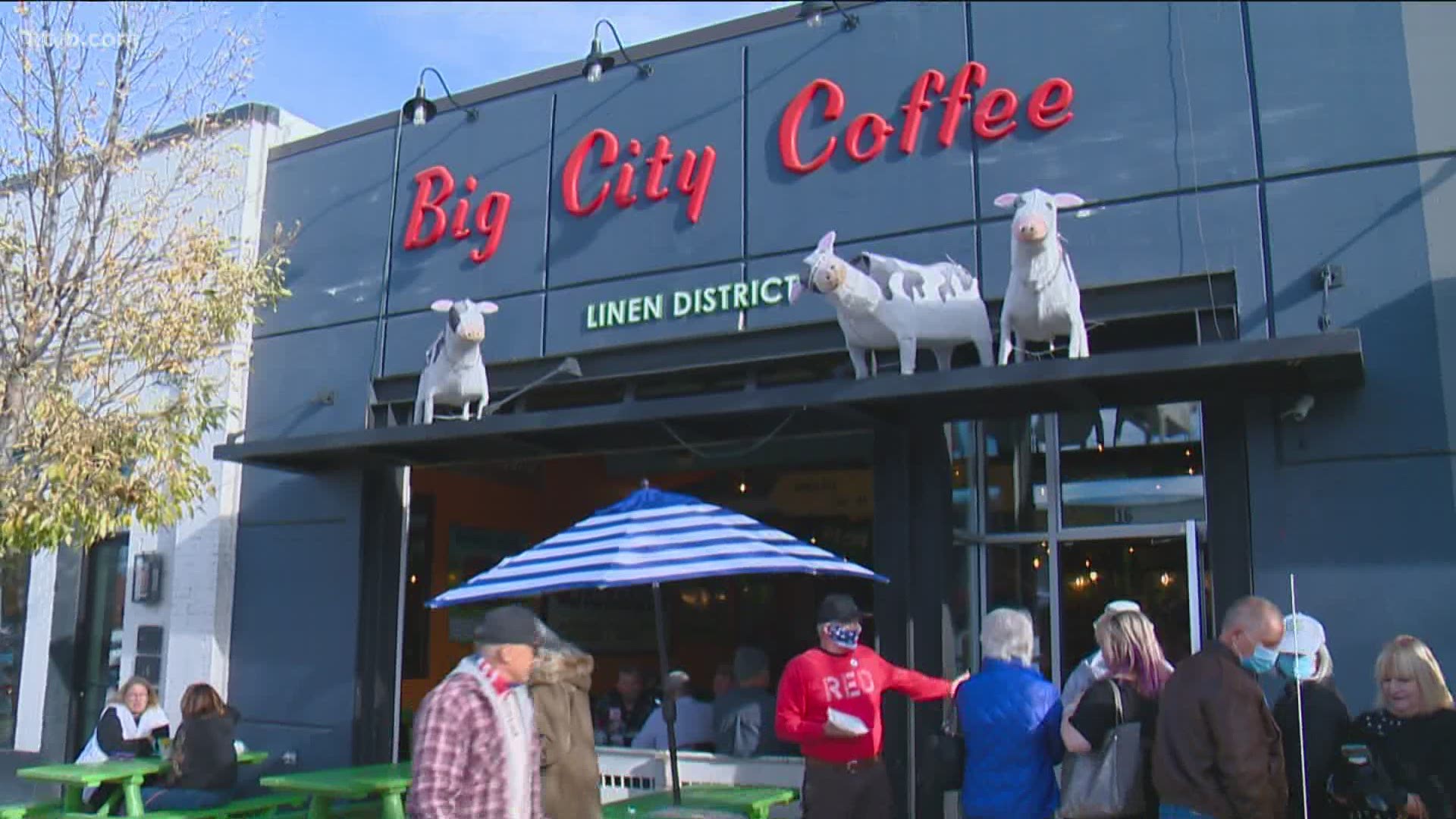BOISE, Idaho — Editor's Note: This story was originally published in the Idaho Press.
Big City Coffee has filed a notice of tort claim against Boise State University declaring the business suffered $10 million in damages after the university and the coffee shop ended their contract together.
Big City Coffee last year closed its recently opened BSU campus location after students protested the owner, Sarah Fendley, due to her support of law enforcement.
The tort claim — filed Wednesday by Michael Roe, an attorney at Boise law office Givens Pursley — alleges BSU administrators withheld information from Fendley, including that BSU student government representatives were pressuring administrators to terminate the contract with the coffee shop. That pressure ultimately led administrators to “force the termination” of Big City Coffee’s contract with Aramark, BSU’s contract food service partner, the claim alleges.
The tort alleges BSU administrators were “discussing the potential for controversy as early as July 27.” Had Fendley known about the building controversy over Big City Coffee’s campus location, she may not have opened the coffee shop, in which she invested about $150,000 and opened in early September, the claim says.
“Had BSU not concealed this critical information, Fendley … may have elected not to open the second location, not borrowed over one hundred thousand dollars (during a global pandemic), not purchased equipment, or had the opportunity to take other measures to mitigate the damage she and (Big City Coffee) would ultimately suffer,” it says.
BSU spokesman Mike Sharp on Thursday told the Idaho Press in an email that the university has received notice of the tort claim, and it does not comment on potential or pending litigation.
A notice of tort claim is not a lawsuit, but it is often the precursor to a lawsuit. Tort claims are a written demand to recover money damages from a governmental entity, its employees and/or its representatives alleging misconduct. Tort law requires that the agency involved respond within three months.
In October, the Idaho Press reported that Big City Coffee had closed its BSU branch, Fendley’s second location, after a little over a month of operating, as it faced protests from a faction of students and a lack of public support from the university.
At various times since 2016, Fendley displayed at Big City Coffee’s downtown location flags and a sticker representing the “thin blue line,” which is associated with support for law enforcement and with the blue lives matter movement, a show of unity among police officers as a response to Black Lives Matter.
Word of Fendley’s views spread on campus around the time Big City Coffee opened in early September in the Albertsons Library — it replaced Starbucks, which ended its BSU contract after the spring semester. Members of BSU’s Inclusive Excellence Student Council, a student-government committee that aims to fulfill the needs of underrepresented groups on campus, expressed concerns that Fendley’s support for law enforcement would send “a poor message to black students” and “silence students.”
The tort claim, which has a section describing “diversity and inclusivity” efforts at BSU, suggests the university promotes an “extreme social justice agenda,” and that BSU President Marlene Tromp is “fully committed to the social justice movement.”
“This deep-seated institutional and individual bias is important context for the actions taken by BSU against Fendley and (Big City Coffee), which form the basis of this claim,” it says.
Listed as defendants in the tort are Tromp; Leslie Webb, vice president for student affairs and enrollment management; Alicia Estey, vice president for university affairs and Tromp’s chief of staff; and Francisco Salinas, assistant to the vice president for equity initiatives.
According to the claim, Fendley along with her fiance, Kevin Holtry, a retired police officer who was paralyzed in the line of duty, and two others had a meeting with BSU administrators and an Aramark representative on Oct. 22. In that meeting, Webb said Big City Coffee had caused a “firestorm” on campus, the claim states. “It was clear that BSU had already decided that it was going to force the termination” of Big City Coffee’s contract, the tort claim alleges.
The climax of the meeting, according to the claim, came when Fendley “asked Webb if the University would back her up in the face of the unfair criticism,” and “Webb said, ‘That’s not going to happen.’” After the Aramark representative — who is not named in the claim — suggested the campus location close until January, Fendley asked if BSU “would then support” Big City Coffee.
“At that point, Estey said, ‘I think it is best that we part ways,’” the tort claim says. “Her statement was not an invitation for further discussion or a mere observation. It was made in a manner and context that left no doubt that (Big City Coffee’s) time on the BSU campus had come to an end.”
After reports surfaced in October of Big City Coffee’s departure from BSU, the university released a statement, which said, in part, “At no time did the administration at Boise State ask Big City Coffee to leave campus. At no time did the administration ask Big City Coffee to compromise the owner’s First Amendment rights.”
The tort claim alleges the defendants slandered and libeled Fendley, interfered with her contract, defrauded Fendley by “concealing and misrepresenting” information upon which Fendley “detrimentally relied,” and violated Big City Coffee’s First and 14th Amendment rights.
The claim suggests Fendley suffered damages in excess of $10 million, based on the cost to open the campus shop, lost income the shop would have generated had it remained open, and “reputational and emotional damages suffered due to being wrongfully and maliciously labeled as a racist and a white supremacist.”
Ryan Suppe is the Boise City Hall and Treasure Valley business reporter for the Idaho Press. Contact him at 208-344-2055 (ext. 3038). Follow him on Twitter @salsuppe.

